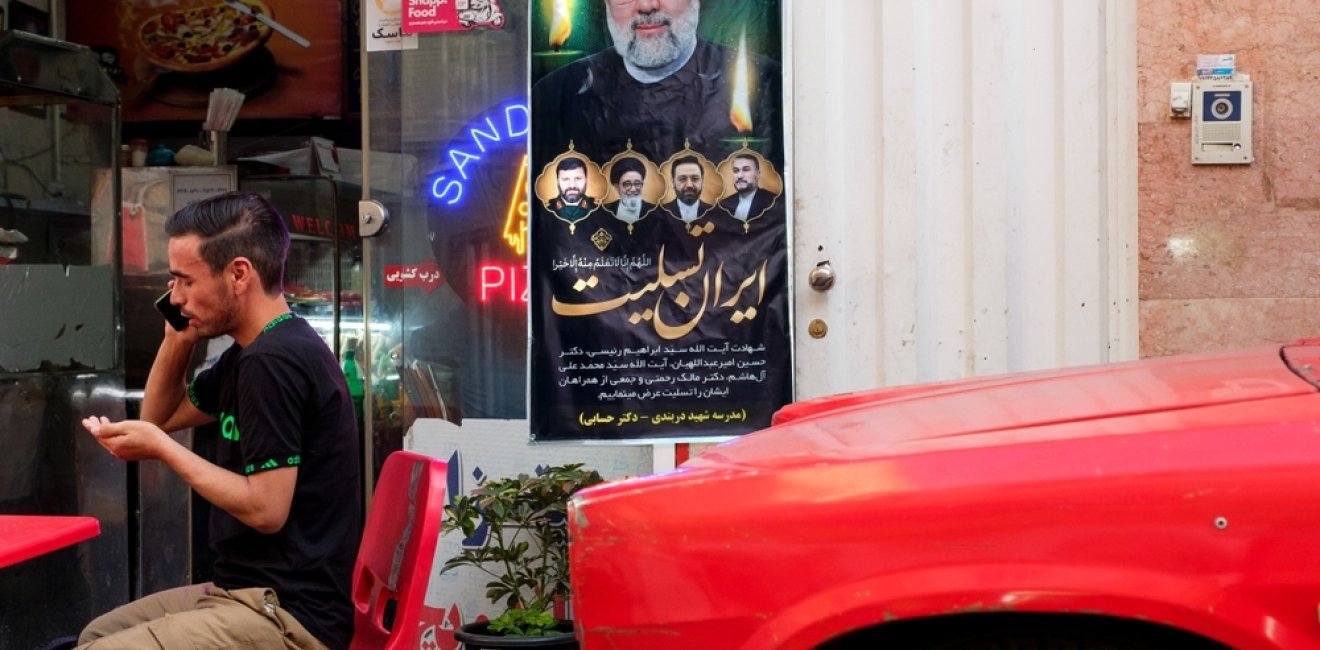“The only real martyr here is the captain who flew straight into the hill. This was my favorite joke,” a 33-year-old computer engineer in Tehran said with a laugh.
“We were talking about the fall of all clerics, but fine, we’ll still take these few,” reads a widely circulated meme on social media among Iranians inside Iran and beyond. After former Iranian president Ebrahim Raisi—a hardline cleric known for his human rights violations as head of Iran’s judiciary—died in a helicopter crash along with seven other passengers and crew, the momentary healing power of jokes took center stage.
Nearly two weeks after Raisi’s death, jokes and memes are uniting Iranians in their grief, anger, and ever-present contempt toward a regime they believe has robbed them of their basic human, social, and civil rights.
Comedic traditions in Iran
“The only real martyr here is the captain who flew straight into the hill. This was my favorite joke,” a 33-year-old computer engineer in Tehran said with a laugh. “There was another one I loved: A brown bear looks out the window, telling his mom, ‘Mom, I don’t like to eat this,’ referring to the president.” She joyously recalled how Monday morning was indeed a ‘good morning’ for many ordinary Iranians. More than any other time since the 1979 Islamic Revolution, Iranians are fed up with the theocracy of the 85-year-old Ayatollah Ali Khamenei.
Throughout history, Iranians have relied on satire and comedy to express some of their most vital grievances. Whether in public or private, jokes remain prevalent weapons in an arsenal against a powerful force they know they cannot fight or a numbing agent for the pain of knowing what they cannot change.
In the 14th century, the great Obeyd Zakani used his humor to oppose religious hypocrisy and social inequality. Other great literary figures of the late 19th and early 20th century also relied on satire to oppose the unhinged political and economic ineptitude of the Qajar dynasty and express people’s desperation for a constitutional government. Bibi Khanum Astarabadi, a champion of education and women’s rights, wrote a satirical book against patriarchy and misogyny called Maayeb Al Real (Men’s Faults) in 1934 during the reign of the first Pahlavi monarch.
Comedy and tragedy
“Yes. People were happy [about Raisi’s death], but either they’re afraid to express it publicly at work, or on the streets, or they just don’t have the energy to even be bothered to care. But, in their hearts, I bet you the majority is thinking: who can be next?” explained a graphic designer and photographer. He was planning a week-long getaway with his wife and friends to a resort town near the Caspian Sea before the government announced a 5-day period of ‘public mourning.’ “When I first heard of the news, I was thinking to myself: I hope they don’t die in a crash and get eaten by the wild animals. But, then again, I felt bad for the animals,” he said with a shameless smirk.
The tragedy of it all is precisely what evokes such repugnance toward the behavior of regime officials and the religious, political, financial, social, and cultural oppression of the regime over the last 45 years.
A 42-year-old female doctor in Tabriz, the capital city of East Azerbaijan where the president’s helicopter was headed before crashing in the lush forests of Arasbaran, explained how Mohammad Ali Ale-Hashem, the supreme leader’s clerical representative in the province, had a mid-size conservative following while many others, especially the younger generation, “could not care less.”
“Some people are so brainwashed that they simply don’t realize that these people are the sole reason behind all that’s wrong in Iran.” In a beautiful accent unique to the Iranian Azeris and with a profound sense of disquiet, she pleaded for her country. “Iran needs help. We need help. Iran needs change.”
Somewhere between the outpouring of satirical ridicule and, at times, apathy of the rest of this vast nation of 89 million rests the truth about the current state of the Islamic regime: their inability to engage with and be trusted by the country’s most valuable asset, the Iranian people.
Factoring out the 10% of ultra regime loyalists and their supporters of “convenience,” the remaining 70+ million believe their country is taken hostage by those in charge.
Broken trust
When one-third of a nation lives in poverty, and poultry and eggs have become luxury items for more than 50% of the population in one of the world’s most oil, gas, and agriculturally rich countries, hope evolves into a stagnant state of disbelief. When one out of three marriages ends in divorce in less than a year, more than 40% of university graduates are unemployed, mass migration increases by the day, and the inflation rate fluctuates at around 40%, aspirations turn into helplessness and decay.
Two recent events compounded with back-breaking socioeconomic challenges have left no trust between most of the Iranian public and the regime. First, the IRGC’s downing of the Ukraine passenger jet in 2020. Second, the ferocious crackdown on protestors who rose up against decades of gender apartheid in what became known as the Women, Life, Freedom movement. If you ask Iranians, many will say that these two events were the final straws that unmasked the incorrigible nature of this regime. One that, according to many, has ‘humiliated’ them to their core.
If all goes as planned, on June 28, Iranians are expected to vote for the next president. As of June 2, and often seen before, former and current government officials, members of parliament, and members of the private sector flocked to the Ministry of Interior to register their candidacy, which is contingent on their approval by the Council of Guardians. Former conservative president Mahmoud Ahmadinejad, three-time Speaker of Parliament Ali Larijani, conservative nuclear negotiator Saeed Jalili (once Ahmadinejad’s protege), Tehran’s conservative mayor Alireza Zakani, and Abdolnasser Hemati (who was Raisi’s only contender in 2021) were among the more notable candidates. Both Ahmadinejad and Larijani, among other known political figures, including moderates and reformists, were disqualified by the Guardian Council in 2021.
“There was a time when people believed in some sort of reform—not because they believed in the regime, but [because] they believed in the possibility of seeing some form of change in their lives,” explains a 40-year-old pollster and data analyst. In 2009, he supported then ‘reformist candidate’ Mir Hossein Mousavi, who remains under house arrest to this day. “But not today. Not anymore. The regime has proven to be immutable—at least in the short-term.”
A joke of an election
Regardless of the nature of the crash—accident or foul play—this burning humiliation topped with wide-spread disillusionment will do permanent damage to one of the most boastful dictatorships in the world. As the country’s supreme leader prepares for another circus election—similar to what he orchestrated in 2021 that helped elect the late president—in less than 50 days the majority of the Iranian people are anticipated to be nowhere near the polls, showing their dissent. Similar to the parliamentary elections in March that hit a record low, the upcoming presidential election will, once again delegitimize an already tainted regime.
“Even if Khamenei brings forth the most ‘reformist’ of them all, people are not going to buy into their lies. At least for now,” said the former campaigner for Mir Hossein Mousavi, who also voted twice for Hassan Rouhani in 2013 and 2017.
Elections have always been a tool for the supreme leader’s theocracy to legitimize itself regionally and on the world stage. There was once upon a time when people could be ‘fooled,’ but this time, they see through with clear eyes equipped with decades of experience, perpetual disappointment, and in their words, ‘humiliation.’ This time, in yet another sham spectacle of an election, the joke will be on the regime.
The views expressed in this piece are those of the author and do not express the official position of the Wilson Center.








